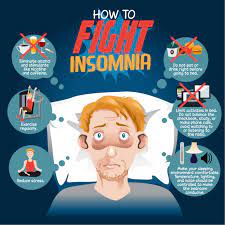Zoloft Insomnia: Causes, Effects, and Management
Insomnia is a common side effect of many medications, including Zoloft (sertraline), a widely prescribed antidepressant. While Zoloft is effective in treating depression and anxiety disorders, it can also disrupt sleep patterns for some individuals.
Causes of Zoloft-Induced Insomnia
Zoloft belongs to a class of medications known as selective serotonin reuptake inhibitors (SSRIs). These drugs work by increasing the levels of serotonin in the brain, which can lead to improved mood but may also interfere with the body’s natural sleep-wake cycle. The disruption in serotonin levels can contribute to difficulties falling asleep or staying asleep.
Effects of Insomnia on Zoloft Users
Insomnia caused by Zoloft can have various effects on individuals taking the medication. Lack of quality sleep can result in daytime drowsiness, fatigue, irritability, difficulty concentrating, and impaired cognitive function. Prolonged insomnia can also exacerbate mental health conditions such as depression and anxiety.
Managing Zoloft-Induced Insomnia
If you are experiencing insomnia while taking Zoloft, it is essential to discuss your symptoms with your healthcare provider. They may recommend the following strategies to help manage insomnia:
- Adjusting the timing of your medication: Taking Zoloft in the morning instead of at night may reduce its impact on sleep.
- Incorporating good sleep hygiene practices: Establishing a bedtime routine, creating a comfortable sleep environment, and avoiding stimulants before bed can promote better sleep.
- Exploring relaxation techniques: Practicing mindfulness meditation, deep breathing exercises, or progressive muscle relaxation can help calm the mind and body before bedtime.
- Sleep aids: In some cases, healthcare providers may prescribe short-term sleep aids to alleviate insomnia symptoms while adjusting to Zoloft.
It’s crucial not to make any changes to your medication regimen without consulting your healthcare provider. They can provide personalized guidance on managing insomnia while ensuring that your mental health needs are adequately addressed.
Remember that managing insomnia associated with Zoloft is possible with proper support and guidance from healthcare professionals. By addressing this side effect proactively, you can continue benefiting from the therapeutic effects of Zoloft while promoting restful and rejuvenating sleep.
9 Effective Tips to Combat Insomnia While Taking Zoloft
- Establish a bedtime routine to signal your body that it’s time to sleep.
- Avoid caffeine and other stimulants close to bedtime.
- Create a comfortable sleep environment that is cool, dark, and quiet.
- Limit screen time before bed as the blue light can disrupt your sleep cycle.
- Engage in relaxation techniques like deep breathing or meditation before sleep.
- Try to exercise regularly but avoid vigorous workouts close to bedtime.
- Consider talking to your healthcare provider about adjusting your Zoloft dosage or timing.
- Explore cognitive-behavioral therapy for insomnia (CBT-I) with a qualified therapist.
- Keep a sleep diary to track patterns and discuss with your healthcare provider.
Establish a bedtime routine to signal your body that it’s time to sleep.
Establishing a bedtime routine is a helpful tip for managing Zoloft-induced insomnia. By creating a consistent series of calming activities before bed, such as reading a book, taking a warm bath, or practicing relaxation techniques, you can signal to your body that it’s time to wind down and prepare for sleep. This routine can help train your brain to associate these actions with bedtime, making it easier to transition into a restful night’s sleep despite the potential sleep disturbances caused by the medication.
Avoid caffeine and other stimulants close to bedtime.
To manage insomnia associated with Zoloft, it is advisable to avoid consuming caffeine and other stimulants close to bedtime. Caffeine is a potent stimulant that can disrupt sleep patterns and make it challenging to fall asleep. By steering clear of caffeinated beverages like coffee, tea, and energy drinks in the hours leading up to bedtime, individuals taking Zoloft can promote better sleep quality and reduce the likelihood of insomnia. Opting for decaffeinated alternatives or soothing herbal teas can be a more conducive choice for winding down before sleep.
Create a comfortable sleep environment that is cool, dark, and quiet.
Creating a comfortable sleep environment that is cool, dark, and quiet can significantly help in managing Zoloft-induced insomnia. A cool room temperature promotes relaxation and can make it easier to fall asleep. Darkness signals to the body that it is time to rest, while minimizing light exposure during sleep can improve sleep quality. Additionally, a quiet environment reduces distractions and disturbances, allowing for a more peaceful and uninterrupted night’s rest. By optimizing your sleep environment in these ways, you can enhance your chances of getting the restorative sleep needed to support your overall well-being while taking Zoloft.
Limit screen time before bed as the blue light can disrupt your sleep cycle.
Limiting screen time before bed is a helpful tip for managing Zoloft-induced insomnia. The blue light emitted by screens, such as those on smartphones, tablets, and computers, can interfere with the body’s natural sleep cycle by suppressing the production of melatonin, a hormone that regulates sleep. By reducing exposure to blue light in the evening hours, individuals taking Zoloft can promote better sleep quality and enhance their overall well-being. Incorporating this simple practice into a bedtime routine may contribute to improved sleep patterns and better management of insomnia symptoms associated with Zoloft medication.
Engage in relaxation techniques like deep breathing or meditation before sleep.
Engaging in relaxation techniques such as deep breathing or meditation before bedtime can be a helpful strategy for managing Zoloft-induced insomnia. These practices can calm the mind, reduce stress and anxiety, and promote a sense of relaxation that may aid in falling asleep more easily. By incorporating these techniques into your nightly routine, you can create a peaceful environment conducive to restful sleep, potentially mitigating the disruptive effects of insomnia while taking Zoloft.
Try to exercise regularly but avoid vigorous workouts close to bedtime.
It is advisable to incorporate regular exercise into your routine to help manage Zoloft-induced insomnia. Engaging in physical activity can promote better sleep quality and overall well-being. However, it is essential to avoid vigorous workouts close to bedtime, as intense exercise can increase alertness and make it harder to fall asleep. Opt for gentle exercises earlier in the day, such as yoga or walking, to reap the benefits of physical activity without disrupting your sleep patterns. By striking a balance between staying active and maintaining a sleep-friendly routine, you can support your body’s natural sleep-wake cycle while taking Zoloft.
Consider talking to your healthcare provider about adjusting your Zoloft dosage or timing.
Consider discussing with your healthcare provider the possibility of adjusting your Zoloft dosage or the timing of when you take the medication to help alleviate insomnia symptoms. Your healthcare provider can provide guidance on how to make these adjustments safely and effectively, ensuring that you continue to receive the benefits of Zoloft for managing depression or anxiety while minimizing the impact on your sleep quality. Open communication with your healthcare provider is essential in finding a solution that works best for you and supports your overall well-being.
Explore cognitive-behavioral therapy for insomnia (CBT-I) with a qualified therapist.
For individuals experiencing insomnia as a side effect of Zoloft, exploring cognitive-behavioral therapy for insomnia (CBT-I) with a qualified therapist can be a beneficial approach. CBT-I is a structured, evidence-based therapy that targets the underlying causes of insomnia by addressing thoughts, behaviors, and habits that contribute to sleep difficulties. A qualified therapist can work with individuals to develop personalized strategies to improve sleep quality, establish healthy sleep patterns, and address any psychological factors affecting their ability to rest. By incorporating CBT-I into their treatment plan, individuals can enhance their overall well-being and better manage Zoloft-induced insomnia.
Keep a sleep diary to track patterns and discuss with your healthcare provider.
Keeping a sleep diary to track patterns of insomnia while taking Zoloft is a valuable tip for managing this side effect effectively. By documenting your sleep quality, duration, and any associated factors such as medication timing or lifestyle habits, you can provide valuable insights to your healthcare provider. Discussing your sleep diary with your healthcare provider allows for a more in-depth understanding of your insomnia patterns and enables them to tailor recommendations or adjustments to your treatment plan accordingly. This proactive approach can lead to better management of Zoloft-induced insomnia and improved overall sleep quality.




